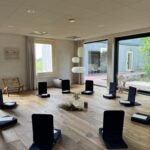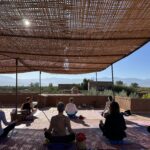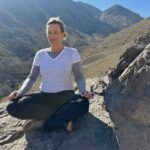This is part nine of a series exploring the ten principles of yoga philosophy, also known as the yamas and niyamas. In this series of blog posts, we explore how we can bring this fascinating ancient wisdom into our daily lives.
Whether or not you practice yoga or not is not very important. These principles are all about making this world, an even better place to live in.
Tapas, let’s turn up the Heat!
Tapas, traditionally, refers to the fire at the center of a ritual.
Over time, it morphed into a more subtle meaning of austerity, concentrated discipline, penance or heat. And, in the Yoga Sutras, it took the meaning of staying in the tension of opposites. Eventually, we began to boil it down to self-discipline.
Some people have a bit too much; some people can use a bit more.
Self-discipline is one of the keys to living a light and joyful life. When we practice tapas, we can create new patterns for our body, mind and speech.
It’s the cultivation of self-discipline that allows us to be present in the here and now. Being present with whatever is occurring, whether it be positive, negative or neutral. I often mention these words in guided meditations when we observe our thoughts. Our thoughts can be pleasant, unpleasant or neutral: whatever they may be, we stay and observe.
Running out of battery
If you see willpower as a battery, it makes total sense that we sometimes run out of power.
When you have too many goals to accomplish, there’s simply no energy left at the end of the day to ‘be good’ until the end.
Let me give you an example of what daily life might look like.
When it takes you a good deal of effort just to get out of bed in the morning to meditate for 20 minutes, you have used up quite a bit of your willpower battery already, before even having breakfast.
When you then meet your commitment to eat healthy by making a good breakfast and taking your homemade lunch with you to work, this uses another big chunk of your willpower battery.
Add to that a firm commitment to work hard at your job, maybe even go to the gym or a yoga class after work.
By the time you come home, you could be in a bit of a pickle: There is just enough energy left to take care of the family and call your mum.
But simply no energy left whatsoever to take care of yourself, let alone do something really rejuvenating in the evening.
And, you think, “But I did so well, all day.”
Failing at the end here makes perfect sense if you see will power and self-discipline as a battery!!!
“Oh, c’mon, Rachel, just run.”
“I am not a runner”, or that’s what I had said enough to myself to believe it. I started a couple of times 20 years ago and I really didn’t like it.
My stomach got all upset and I blamed this on years of taking overloads of migraine medications, leading to a missing gallbladder, kidney and liver issues, etc.
These were nothing but wonderful excuses, as objectively, none of these issues makes you unable to run.
Recently, I met a wonderful woman, Alice, who invited me to jog along with her on the beach in Morocco. I found myself agreeing. It sounded like a really nice thing to do and it fit my plan as I had made the resolution to be fitter than ever this year.
Little did I know then that Alice had run Marathon des Sables, meaning she’d run six (!) marathons in five (!) days, in the Moroccan Sahara!
Every time I would ask Alice whether I should build things up or have running schemes, she would simply answer: “Oh, c’mon, Rachel, just run.” And so I did.
My stomach got seriously upset on our first runs, storming into all kinds of very unnecessary fight or flight actions and my mind would frequently try to re-mind me that I am not a runner. But I just kept following her, step after step, mile after mile.
Whether I really should have built up to it or not is beside the point, because what stuck were her words: “Oh c’mon, Rachel, just run.”
Because I knew exactly why I wanted to run—I wanted to be fitter than ever this year—I got on with it.
Repeating these words didn’t make the running easy, but they surely made it a lot easier.
A compelling reason to run and a mantra to keep me going when things started to become difficult were all I needed to have the self-discipline to keep running.
Tapas in your yoga class
Whether you see yoga classes as sports or not, the practice of holding a posture has everything to do with tapas.
In some lessons, I have students stay in a position a lot longer than the usual five to 10 breaths.
The immediate response is that the students want to get out of the position. But sometimes the magic of experiencing awareness and mindfulness in class only happens when we stay—when we don’t move.
Not when there is a sharp pain in back, neck, knees or hips, of course. To explore this, I advise students to practice with a qualified teacher to help identify that fine line between discomfort and pain.
Self-discipline holds the key to calming our distracted minds. Buddhism describes the mind as being filled with monkeys, hence the term ‘monkey mind’.
These monkeys swing from one branch of thought to the next, wanting the next banana, the next big thing, the next small thing.
Always wanting something.
Monkey minds love multitasking: worrying, planning, and dreaming all at the same time. They like to be mindless.
When we develop tapas, the heat of our fire consumes the distractions of monkey mind so it can be focused and mindful.
The self-discipline burns distractions so our minds can purify.
EXERCISE: ANALYZE YOUR DAY
If you are serious about reaching your full potential? In that case, I have a little assignment for you.
How often do you go through your days on autopilot?
You get up, you go through the motions of your life, and at the end of the day, you end up feeling exhausted and overwhelmed, as though you didn’t accomplish anything. Ugh…
Writing down everything you do in a day is one of the best ways to get a grip on your time consumption.
Only then can you see and analyze if you are doing the things that produce the outcomes you desire or if you are wasting time.
To do this exercise, get a pen and paper and write down everything you did yesterday.
Include things such as brushing your teeth, making the bed, having breakfast, social media, details about what you did with work, etc.
The order does not have to be chronological, just get it down on paper.
This will give you an accurate idea of what your days actually look like, if you can be truly honest about it.
I hope you liked what you read on tapas, if you have feedback or questions, please don’t hesitate contacting me.
Namaste,
Rachel
Rachel Bonkink holds a Masters Degree in Commercial Sciences, has studied Traditional Chinese Medicine and thrives on teaching yoga and yoga philosophy classes. She has been a life coach for over 10 years and loves spending time by the beach in Morocco. She’s the owner of Revealing Vajra, a leading yoga retreat company. In the past seven years Rachel has organized, marketed and hosted over 60 of her own world wide yoga retreats. At the moment, she is writing a book on how to bring the yoga philosophy into daily life.










Leave a comment